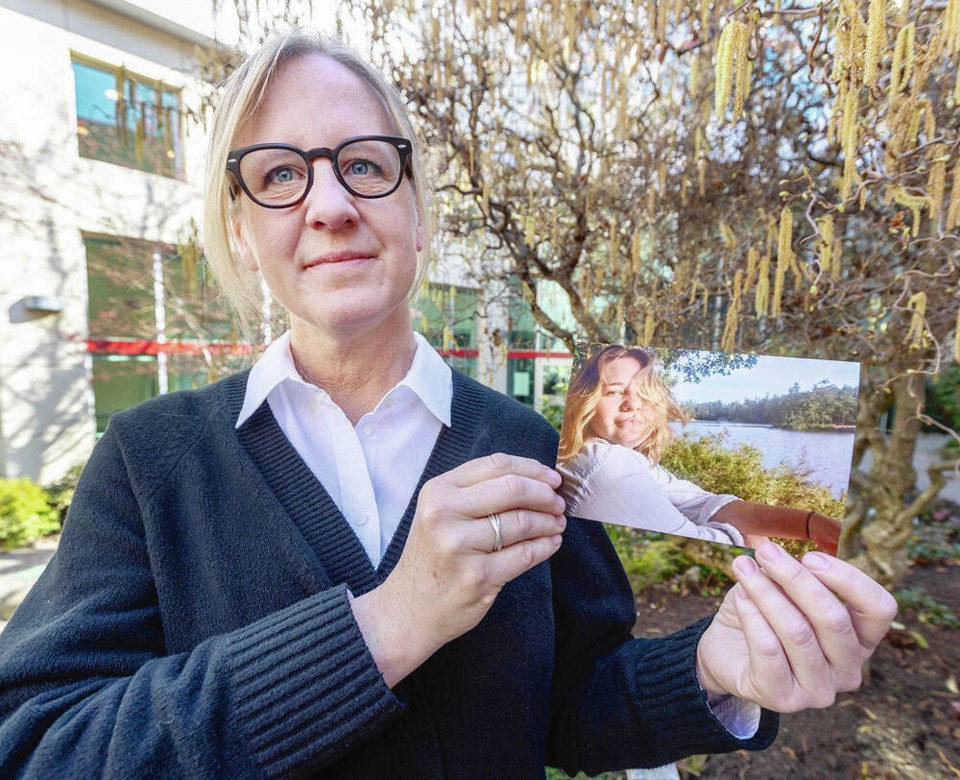After days of intensive care following a suicide attempt, 17-year-old Kelsey Duggan was full of hope about her future — until she entered Royal Jubilee Hospital’s adult mental health ward, and froze.
The teenager was too old for pediatric services but too young to be lumped in with the adults in the hospital’s patient care centre tower ward called 1South, said her mother, Jill Duggan.
Duggan was speaking Monday at an announcement about a new young-adult mental health unit at the hospital. Sixteen of the beds at Royal Jubilee’s general psychiatry unit have been designated for youth ages 17 to 26. The unit was reconfigured in November.
“Kelsey was so vulnerable and at 17 she was not an adult,” Duggan said. “She left ICU — where she had been on life support — full of hope and she was talking about being a nurse, being so thankful for being alive.”
When they walked through the doors of the adult ward, the secure doors closed behind them “and I was holding her hand and I could just feel the fear come up through her arm to mine,” she said. Kelsey crawled under a shelving unit in the room, too terrified to come out.
Staff were “excellent,” said father John Duggan, but “I think it was just walking into a ward with 33-year-old men and she was just 17.”
The young-adult unit — for voluntary and involuntary patients requiring acute-care admission — is adding a clinical counsellor, mental health workers and peer support workers.
It is increasing the number of nurses, occupational therapists and recreational therapists, and offering group programming such as cognitive behavioural therapy, dialectical behavioural therapy, and relaxation movement.
Psychiatrist Dr. Hendri Eksteen said the unit sees a wide range of mental health challenges from substance-use disorders, mood and psychotic disorders, eating disorders, co-existing issues, and “there’s been quite a shift into some personality disorders.”
Admission to the unit via the hospital’s psychiatric emergency department is based on physician assessment and referral. Young adults must be experiencing an active episode of psychosis or mood disorder and be deemed able to benefit from specialized assessment and recovery-focused programming as well as able to engage in structured programming.
“Unfortunately, there is a high demand and we’re always over census in the units so we rely on discharges before we can get patients in,” Eksteen said in an interview. “I think our turnaround is pretty good if we compare it to other hospitals.”
There are 159 mental-health beds within hospitals in the Island Health region.
Eksteen said Royal Jubilee has three psychiatrists — soon to be four — and will benefit “tremendously” from the broader clinical team, especially those with more experience with young adults.
Jill Duggan spoke about her daughter’s challenges to get mental health care in and outside the hospital system, including her suicide attempts. Kelsey died by suicide at age 20 in November 2020.
Duggan spoke positively about the changes to the unit — but gently made it clear that there’s still more to do given capacity problems, wait-times and gaps in care, especially in out-patient community mental health services and supports.
“Kelsey was discharged with a solid-sounding care plan, but that soon fell apart due to capacity issues and lack of communication between services,” she said.
She said she became a patientcaregiver partner with Island Health soon after her daughter’s death, “trying my best to help fill the gaps that Kelsey fell into.”
The Duggan family was living in Vancouver and fully focused on Kelsey’s older brother. Now 26 and thriving, he was then struggling with his mental health and subsequent substance use.
The family moved to Victoria in hopes that they would benefit from a slower pace and smaller community.
Then in November 2016, Kelsey — described by her parents as “just a ray of sunshine” — made her first suicide attempt. Capable, sociable and organized, she hadn’t let on about how serious her mental health challenges had become.
“The first time was a huge wakeup call and everything changed from there,” John Duggan said.
The 16-year-old was taken to Victoria General Hospital’s four-bed pediatric mental health unit, where her parents said she received good, age-appropriate care. Afterward, they faced months-long waits for out-patient services while other services worked well and connected them to the mental health community.
After her second attempt, Kelsey, then 17, was taken to the all-ages mental health unit at Royal Jubilee. That’s when the Duggans realized the need for a young adult unit.
Jill Duggan said she knows change is slow but believes for now that the ward reconfiguration and specialized staff will help.
“I think Kelsey would have benefited from this young-adult unit,” she said. “It gives me hope.”
>>> To comment on this article, write a letter to the editor: [email protected]




